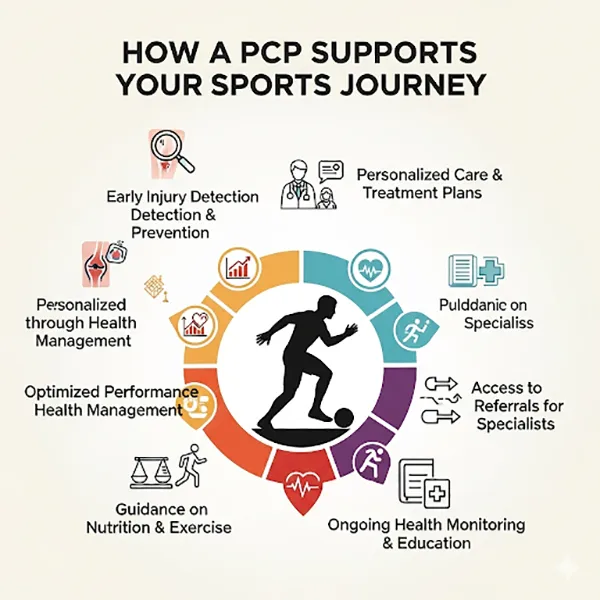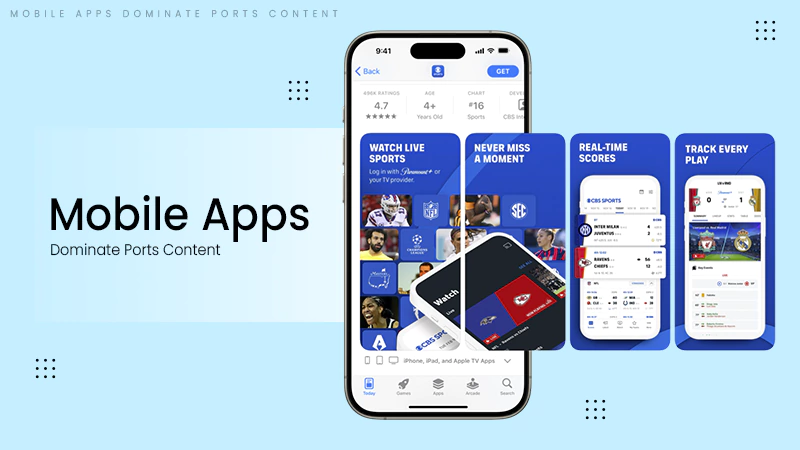
The Underrated MVP: How Your Primary Care Provider Supports Your Sports Performance
When discussing sports performance, the most commonly referred professionals are a personal trainer, a nutritionist, and a coach. However, one critical member of your team is usually absent, and that member is your primary care physician (PCP). According to a 2021 study in the Journal of Athletic Training, almost 50% of sports injuries are preventable with pre-participation physical exams and health monitoring.
What we know is, this is a difficult reality for any athlete and experienced marathoner with a stress fracture on the sideline and season over for a high school soccer player struggling with chronic fatigue on the bench. The doctor’s office is not just a place to get an annual physical or flu shot; it is the beginning of developing a proactive plan to keep athletics moving forward.
Whether you are a seasoned professional or a first time practitioner, there is something you always need to learn. Continue reading this article to know more about it!
KEY TAKEAWAYS
- PCP helps prevent injuries by identifying early warning signs like vitamin deficiencies, overtraining symptoms, or chronic inflammation.
- Better sleep, nutrition, and stress help you perform better and recover faster.
- They are the gateway to the right specialist.
Why Sports Start With Primary Care
Performance doesn’t begin on the field or at the gym. Prevention is the first step. Primary care doctors are in a unique position to identify early warning indicators that could sabotage your fitness journey before symptoms turn into setbacks.
These healthcare professionals monitor your baseline health over time—blood pressure, sleep quality, heart rate, nutrition habits—and understand how those markers interact with physical performance. They see the whole picture, just the tight hamstring or injured ankle, but the sleep debt, underlying stress, or hormonal shifts that might be contributing to it.
They do more than simply respond; they take initiative.
Early Detection = Injury Prevention
Every athlete understands how frustrating an avoidable injury. And most of them are preventable—with the right intervention early on.
That’s where your primary care provider comes in. A PCP has the advantage of continuity, unlike orthopedic specialists, who often only see you once something’s gone wrong. Long before they cause significant harm, they can spot chronic patterns like overtraining symptoms, vitamin deficiencies, and inflammatory conditions.
Fatigue that keeps coming back? Iron levels can be the cause.
Recurring soreness? Maybe you’re not receiving post-workout nutrients.
Shortness of breath during exercise? That’s not just age catching up.
These are the real red flags, and your PCP knows how to read them.
Holistic Health Means Better Performance
Symptoms are not treated separately by your health care physician. They look at lifestyle: stress, diet, sleep, hydration, medications, and recovery.
Athletes who take care of these issues heal more quickly, perform better, and are less likely to get injured. Poor sleep was directly linked to a higher incidence of musculoskeletal injuries at all levels of sports activity, according to a 2022 meta-analysis published in Sports Medicine.
Who helps you fix your sleep? Neither your trainer, nor your yoga instructor.
Your primary care provider.
PCPs can prescribe more than medication, from managing sleep disorders to regulating stress-related hormones—they can guide sustainable behavior change. And that’s what high performance really demands.
Chronic Conditions Don’t Sideline You—They Get Managed
Many recreational athletes juggle asthma, hypertension, and Type 2 diabetes are chronic conditions that can impact athletic performance. It’s not about eliminating these conditions, but managing them intelligently.
Primary care physicians are taught to strike a balance between chronic care and performance goals. They work with you to modify training, recommend safe progressions, and monitor biomarkers that might fluctuate with exercise, instead of simply restricting activity.
Your PCP may advise you on the workouts that enhance cardiovascular health without putting unnecessary strain on your heart, for instance, if you’re managing high blood pressure. If you have asthma, not just a generic daily plan, they can prescribe inhalers based on your sport and training intensity.
This isn’t compromise—it’s customization.
The Gateway to the Right Specialists
You may need to consult a sports psychologist for performance anxiety, an orthopedic surgeon for a damaged ligament, or a cardiologist for a heart murmur.
Your PCP is your assistant or quarterback. They are aware of the professionals who are not only qualified but also a good fit for your athletic goals. More significantly, they give you background information when referring you, saving you from having to start over each time you need advanced care.
Additionally, when you’re juggling other voices, such as those of your physical therapist and trainer —your primary care provider is the one grounded in your overall health. They offer clarity in the noise.
GENERAL FACT : Many countries provide a personal PCP for national-level athletes. For the following reasons:

Your Game Plan Starts Here
Recovering smarter, fueling right, and preventing setbacks is the main goal. And that all starts with your primary care provider.
In case you haven’t had a recent physical, don’t wait for an injury to make the call. Having comprehensive primary care can give you a silent advantage that keeps you on track, minimizes downtime, and lays a solid foundation for the long haul.
Final Thought
If you train your body, invest in gear, and watch what you eat. So why wouldn’t you have someone watching over your overall health with that same attention to detail?
The reality is that your primary care provider is the underrated MVP in your performance journey. Including them in your team could help you achieve your next PR—not by working harder, but by becoming more health-conscious.
Ans: Any good primary care provider can be a critical part of your team to prevent chronic conditions.
Ans: Schedule an appointment in case of any inconvenience.
Ans: Yes. They can even recommend a mental therapist.
Ans: Discuss it with your PCP first to know the potential benefits and risks associated.











